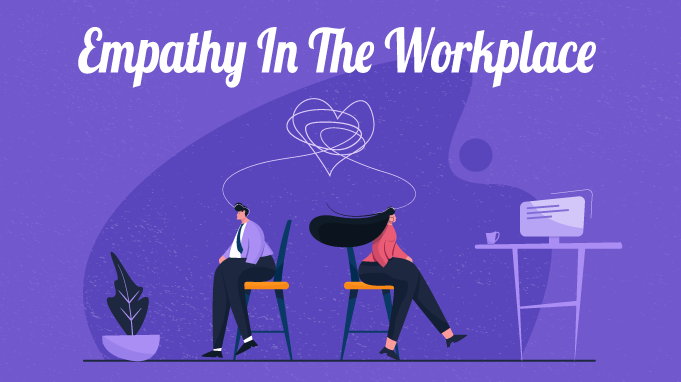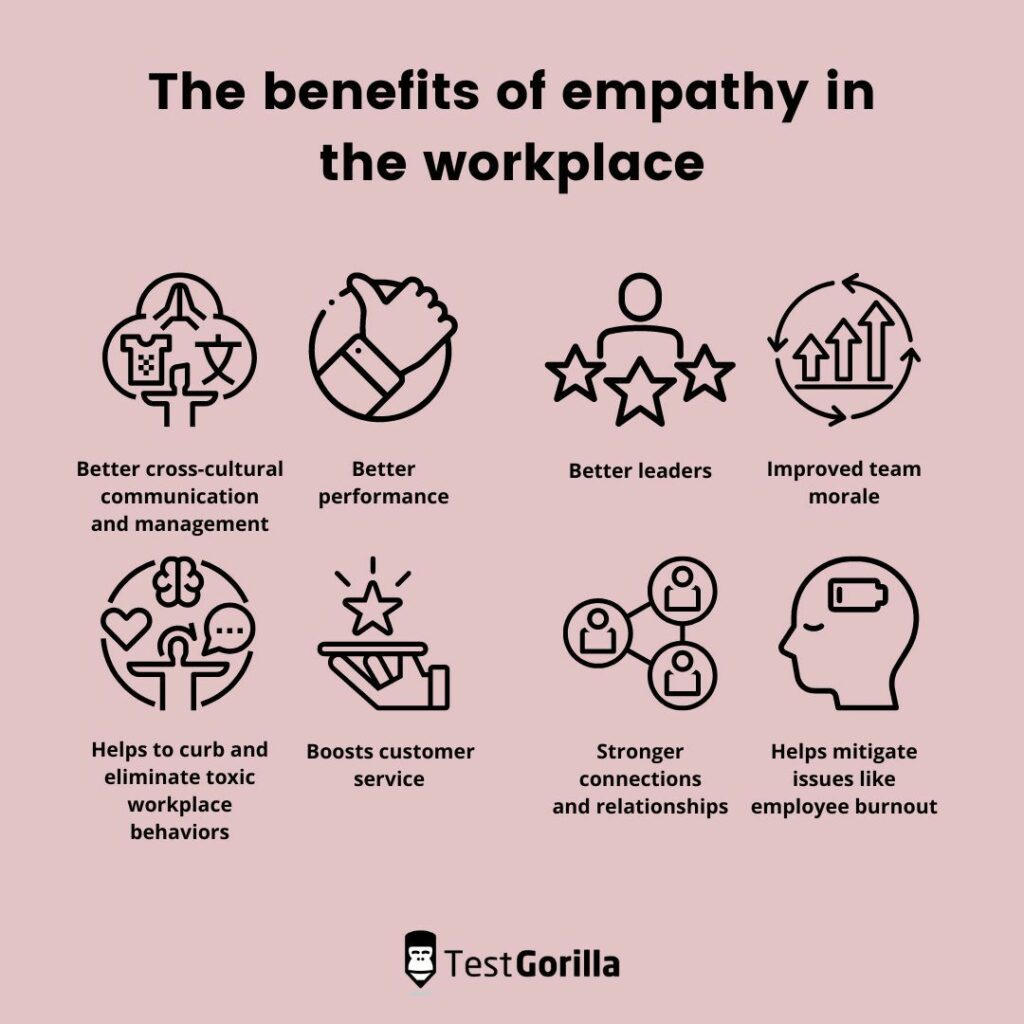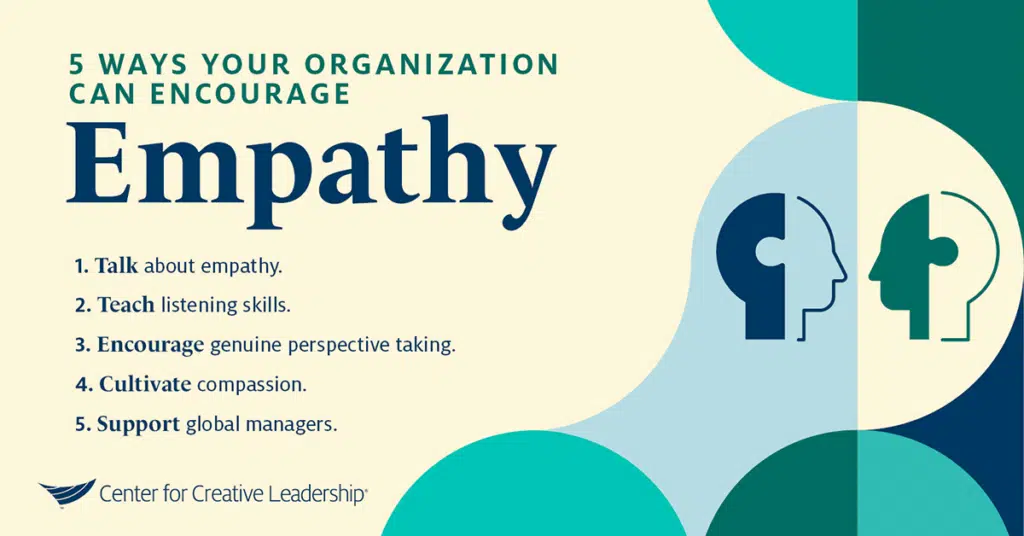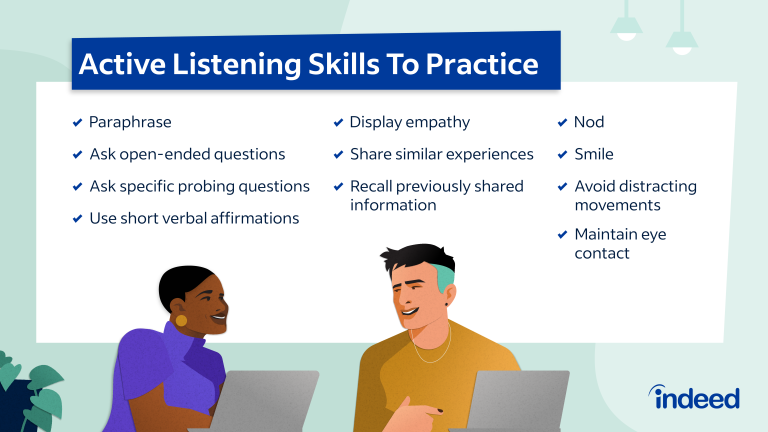How To Be Empathetic in the Workplace
To be empathetic in the workplace, actively listen to others and show genuine concern for their emotions and experiences. Creating a respectful and supportive work environment is essential for fostering positive relationships and high morale among employees.
Empathy plays a crucial role in achieving this goal as it allows individuals to understand and connect with the feelings and perspectives of their colleagues. By being empathetic, we can practice active listening and respond to others in a compassionate manner, which helps to build trust, enhance teamwork, and promote overall well-being in the workplace.
We will explore practical tips and strategies for cultivating empathy at work, enabling you to develop stronger relationships and contribute to a more harmonious and productive working environment.
Understanding Empathy
Understanding empathy is essential in the workplace, allowing us to connect with others on a deeper level and foster genuine relationships. By listening actively, showing compassion, and being understanding, we create a positive and supportive environment where everyone can thrive.
Understanding Empathy Empathy is a crucial skill that plays a vital role in fostering positive relationships and creating a harmonious work environment. When it comes to the workplace, being empathetic can have numerous benefits, such as promoting cooperation, reducing conflict, and improving overall employee morale. In this section, we will delve into the definition of empathy and highlight its importance in the workplace.Definition Of Empathy
Empathy is the ability to understand and share the feelings of another person. It involves putting ourselves in someone else’s shoes and attempting to see things from their perspective. Essentially, it is the act of acknowledging and validating the emotions and experiences of others. Empathy goes beyond sympathy, which is merely feeling sorry for someone; instead, it requires a genuine and heartfelt connection.Importance Of Empathy In The Workplace
Empathy is a necessary ingredient for building strong and productive relationships among colleagues. It fosters a sense of trust and understanding, allowing coworkers to feel valued and respected. By acknowledging and validating the emotions of others, empathy creates a safe and inclusive environment where employees feel comfortable expressing their ideas and concerns. Table: Benefits of Empathy in the Workplace | Empathy in the Workplace | |:——————| | 1. Promotes collaboration and teamwork | | 2. Enhances communication and understanding | | 3. Reduces conflicts and misunderstandings | | 4. Improves employee job satisfaction and morale | | 5. Fosters a positive work culture and employer brand | 1. Promotes collaboration and teamwork: When individuals feel understood and supported, they are more likely to collaborate effectively and contribute their unique skills and perspectives. 2. Enhances communication and understanding: Empathy improves communication by encouraging active listening and empathetic responses. This leads to better understanding and avoids misinterpretations or assumptions. 3. Reduces conflicts and misunderstandings: By considering others’ perspectives and emotions, empathy helps to prevent conflicts and misunderstandings, creating a harmonious work environment. 4. Improves employee job satisfaction and morale: Feeling understood and valued positively impacts job satisfaction and morale, leading to increased productivity and decreased turnover rates. 5. Fosters a positive work culture and employer brand: Empathy creates a positive work culture where employees feel supported, resulting in a stronger employer brand and attracting top talent. Overall, practicing empathy in the workplace results in numerous benefits that contribute to a positive and fulfilling work environment. It improves relationships, boosts productivity, and ensures a harmonious atmosphere where every employee feels valued. By embracing empathy, we can create workplaces that inspire collaboration, understanding, and growth.
Credit: blog.vantagecircle.com
Developing Empathy
Empathy is a valuable skill in the workplace, allowing us to understand and connect with others on a deeper level. Cultivating empathy can foster positive relationships, enhance teamwork, and improve overall productivity. In this section, we will explore three key practices to develop empathy: active listening, putting yourself in someone else’s shoes, and practicing non-judgment.
Active Listening
Active listening involves not just hearing the words that others are saying, but also paying attention to their body language and tone of voice. To actively listen, maintain eye contact, nod to show you’re engaged, and avoid interrupting. By making the person feel heard and understood, you create a safe space for them to share their thoughts and concerns.
Put Yourself In Someone Else’s Shoes
Empathy is all about understanding and sharing someone else’s feelings. To do this, try to imagine yourself in their situation. Consider how you would feel if you were facing the same challenges and obstacles. By putting yourself in their shoes, you can better relate to their experiences and respond with empathy and compassion.
Practice Non-judgment
In order to be truly empathetic, it’s essential to let go of judgments and biases. Approach each situation with an open mind, free from preconceived notions. Recognize that everyone has their own unique perspectives, experiences, and emotions. By practicing non-judgment, you create a safe and inclusive environment where individuals feel comfortable expressing themselves.
Developing empathy is an ongoing process that requires conscious effort and practice. By actively listening, putting yourself in someone else’s shoes, and practicing non-judgment, you can enhance your empathy skills and create a more empathetic workplace.
Benefits Of Empathy In The Workplace
Empathy in the workplace brings numerous benefits, fostering better communication, teamwork, and understanding among colleagues. It promotes a positive work environment, increases employee satisfaction, and enhances productivity. Practicing empathy involves actively listening, being open-minded, and showing compassion towards others.
Improved Communication
Empathy plays a crucial role in fostering improved communication within the workplace. When employees practice empathy, they actively listen to others, understand their perspectives, and respond with compassion. This empathetic communication establishes a positive and open environment, where individuals feel heard and valued. By encouraging empathy, organizations create healthier relationships between team members, leading to more effective collaboration and problem-solving.
Enhanced Teamwork
Empathy greatly contributes to enhanced teamwork. When colleagues empathize with one another, they develop a deeper understanding of each other’s strengths, weaknesses, and challenges. This understanding fosters trust and mutual respect, enabling individuals to work together more cohesively towards shared goals. As a result, teams that cultivate empathy experience higher levels of cooperation, productivity, and innovation.
Increased Employee Satisfaction
Practicing empathy in the workplace significantly increases employee satisfaction. When employees feel empathy from their colleagues and leaders, they are more likely to feel supported and valued. This positive emotional connection creates a sense of belonging and boosts morale. Empathy also promotes a healthy work-life balance by acknowledging and accommodating individual needs and challenges. When employees are satisfied and fulfilled, they are more likely to be loyal, engaged, and motivated, leading to improved overall performance and a positive work culture.

Credit: www.getimpactly.com
Challenges To Empathy
Empathy in the workplace can be challenging due to various factors such as differences in communication styles, lack of awareness, and time constraints. Nevertheless, fostering empathy is crucial for creating a positive and inclusive work environment.
Overcoming Bias And Stereotypes
Bias and stereotypes can hinder our ability to empathize with others in the workplace. These preconceived notions and prejudices can cloud our judgment and affect how we perceive the experiences and emotions of our co-workers. Overcoming bias and stereotypes requires a conscious effort to challenge these ingrained beliefs and replace them with empathy and understanding. It involves recognizing that each individual is unique and has their own thoughts, feelings, and experiences. By actively working to dismantle bias and stereotypes, we can create a more inclusive and empathetic workplace. Here are a few strategies to help overcome bias and stereotypes:- Challenge your assumptions: Instead of relying on stereotypes, actively challenge and question your own assumptions. Seek to understand the individual behind the generalizations and treat them as such.
- Listen actively: Actively listen to your co-workers without judgment or interruption. This will help you gain a deeper understanding of their perspectives and emotions.
- Engage in perspective-taking: Put yourself in the shoes of others to understand their experiences better. This can be done through open conversations, seeking feedback, or engaging in empathy-building exercises.
- Expose yourself to diversity: Expand your understanding and knowledge by exposing yourself to diverse ideas, cultures, and backgrounds. Attend diversity training programs or join affinity groups to broaden your horizons.
- Challenge biased language and behavior: Speak up when you witness biased language or behavior in the workplace. By addressing such incidents, you create a more inclusive environment where empathy can thrive.
Dealing With Emotional Exhaustion
Empathy can be emotionally demanding, especially if you are constantly exposed to the challenges and emotions of others in the workplace. This emotional exhaustion can hinder your ability to empathize effectively and lead to burnout. To maintain empathy while avoiding emotional exhaustion, consider the following strategies:- Practice self-care: Prioritize self-care activities that promote relaxation and rejuvenation. Engage in activities such as exercising, meditating, or pursuing hobbies that help manage your own emotions and stress levels.
- Set boundaries: Establish clear boundaries between your personal and professional life. This includes setting limits on the emotional energy you invest in the workplace and knowing when to take breaks or seek support.
- Build a support network: Surround yourself with colleagues, friends, or mentors who can provide emotional support and understanding. Having someone to lean on can help you navigate difficult situations and maintain your empathetic outlook.
- Practice emotional resilience: Develop resilience skills to better cope with challenging situations. This may involve building emotional intelligence, practicing mindfulness, or seeking professional help if needed.
Addressing Cultural Differences
Cultural differences can present unique challenges when it comes to empathy in the workplace. Understanding and respecting different cultural norms, values, and communication styles is crucial for fostering empathy in such environments. Here are some strategies for addressing cultural differences:- Education and awareness: Educate yourself about different cultures, customs, and practices to cultivate cultural competence. Awareness about cultural differences will help you better understand and empathize with individuals from diverse backgrounds.
- Open communication: Encourage open and respectful communication in the workplace. Create a safe space where individuals can share their experiences, perspectives, and concerns without fear of judgment or discrimination.
- Flexibility and adaptability: Be open to adapting your own behavior and communication style to accommodate cultural differences. This will help bridge gaps and create a more inclusive environment.
- Seek feedback: Actively seek feedback from your co-workers to ensure that your words and actions are not inadvertently insensitive or disrespectful. Continuously learn from others to improve your cultural understanding and empathetic response.
- Embrace diversity: Embrace and celebrate diversity in the workplace. Encourage collaboration and teamwork among employees with different backgrounds, fostering an inclusive and empathetic culture.
Promoting Empathy In The Workplace
Creating a workplace culture that encourages empathy is vital for the well-being and productivity of employees. When individuals feel understood and supported by their colleagues, they are more likely to collaborate, trust, and reach their full potential. This section delves into the strategies that organizations can implement to promote empathy in the workplace.
Training Programs And Workshops
To cultivate empathy among employees, organizations can offer comprehensive training programs and workshops. These initiatives provide individuals with the knowledge and skills needed to develop a deeper understanding of their colleagues’ emotions and experiences. Through interactive sessions and role-playing exercises, participants can enhance their emotional intelligence and learn effective communication techniques.
These training programs can focus on topics such as active listening, conflict resolution, and perspective-taking. By equipping employees with the necessary tools to empathize and connect with others, organizations can foster a more empathetic workplace culture.
Creating A Supportive Environment
A supportive workplace environment lays the foundation for empathetic interactions. Organizations can achieve this by implementing practices that prioritize employee well-being and mental health. This can include offering flexible work arrangements, promoting work-life balance, and providing access to resources such as counseling or mental health programs.
Additionally, creating spaces where employees feel comfortable discussing their emotions and challenges can foster empathy. Encouraging open and respectful dialogue enables colleagues to better understand each other’s experiences and offer support when needed. By establishing a safe and supportive environment, organizations can nurture empathetic connections among employees.
Fostering A Culture Of Empathy
Building a culture of empathy requires more than just individual efforts – it’s a collective responsibility of the entire organization. Leadership plays a crucial role in setting the tone and modeling empathetic behavior. When leaders prioritize empathy and showcase it in their actions and decisions, it sets an example for others to follow.
Organizations can also integrate empathy into their core values and employee evaluation processes. By recognizing and rewarding empathetic behavior, organizations reinforce its importance and encourage employees to prioritize empathy in their daily interactions.
Regular team-building activities and collaborative projects can also contribute to a culture of empathy. These activities provide opportunities for employees to work together, share experiences, and build stronger connections. By nurturing a culture that values empathy, organizations can create a more harmonious and supportive work environment.

Credit: www.testgorilla.com
Frequently Asked Questions On How To Be Empathetic In The Workplace
What Are 5 Ways To Show Empathy?
Here are 5 ways to show empathy: 1. Listen actively: Pay attention and respond to others’ thoughts and emotions. 2. Validate their feelings: Acknowledge and understand their emotions without judgment. 3. Provide support: Offer assistance or simply be present for someone in need.
4. Practice kindness: Show compassion and understanding in your words and actions. 5. Offer encouragement: Empower others by expressing belief in their abilities and strengths.
How Can You Make Sure You Are Being Empathetic At Work?
To ensure empathy at work, listen actively, show understanding, validate emotions, avoid judgments or assumptions, and offer support or help when needed.
How Do You Develop Empathy Skills?
To develop empathy skills, practice active listening and try to understand others’ perspectives. Engage in compassionate conversations and consider different emotions and experiences. Show genuine interest and validate feelings. Reading literature and practicing mindfulness can also enhance empathy.
What Is An Example Of An Empathy Trap?
An example of an empathy trap is when someone becomes too emotionally invested in someone else’s problems and starts neglecting their own well-being. This can lead to burnout and ultimately hinder their ability to provide support effectively.
How Can I Show Empathy In The Workplace?
You can show empathy in the workplace by actively listening, putting yourself in others’ shoes, and offering support.
Conclusion
Being empathetic in the workplace is crucial for fostering a positive and supportive environment. By actively listening, putting yourself in others’ shoes, and showing genuine care, you can build strong relationships and enhance overall productivity. Remember, empathy is not just a soft skill, but a powerful tool that can lead to improved collaboration and teamwork.
Incorporating empathy into your daily interactions will not only benefit your colleagues, but also contribute to your own personal growth and professional success. So start embracing empathy today and watch as it transforms your workplace experience.





